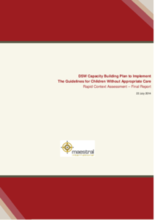This Context Assessment, produced by Maestral International, aims to collect and review all relevant information to support the development of the Department of Social Welfare’s (DSW) institutional capacities to execute the new framework for alternative care in Liberia. With this information, the DSW has established a capacity-building plan which will aid in its efforts to reform children’s care and deinstitutionalize children in residential care in the country.
The Assessment provides a brief recent history of children’s care in Liberia and relevant background information. The methodology used two different tools to examine three levels of intervention: the enabling environment, the organizational level, and the individual level and the strengths, challenges, and capacities at each level. The Assessment highlights key findings from the examination of the legal environment, the institutional architecture and reform processes, capacity building and training opportunities, and the capacities of the Department of Social Welfare. Among the key findings, the assessment concludes that Government of Liberia has a strong and harmonized normative framework for building and/or strengthening the capacities of civil servants and that it is investing considerably in strengthening the capacity set of its workforce. However, the Assessment also finds that Social Welfare is gradually disappearing as a Department and there has not been consistent or continuous levels of investment in building the capacities of the DSW’s staff to enable them to perform their Social Welfare tasks and responsibilities.
The analysis of strengths, weaknesses, opportunities, and threats (SWOT) in this assessment has informed the capacity building plan, which is framed around the following areas of alternative care interventions drawn from the UN Guidelines on Alternative Care: Enactment and enforcement of the legal and policy framework; Availability and range of family-based alternative care services; Networks and partnership; and Public awareness and advocacy.

